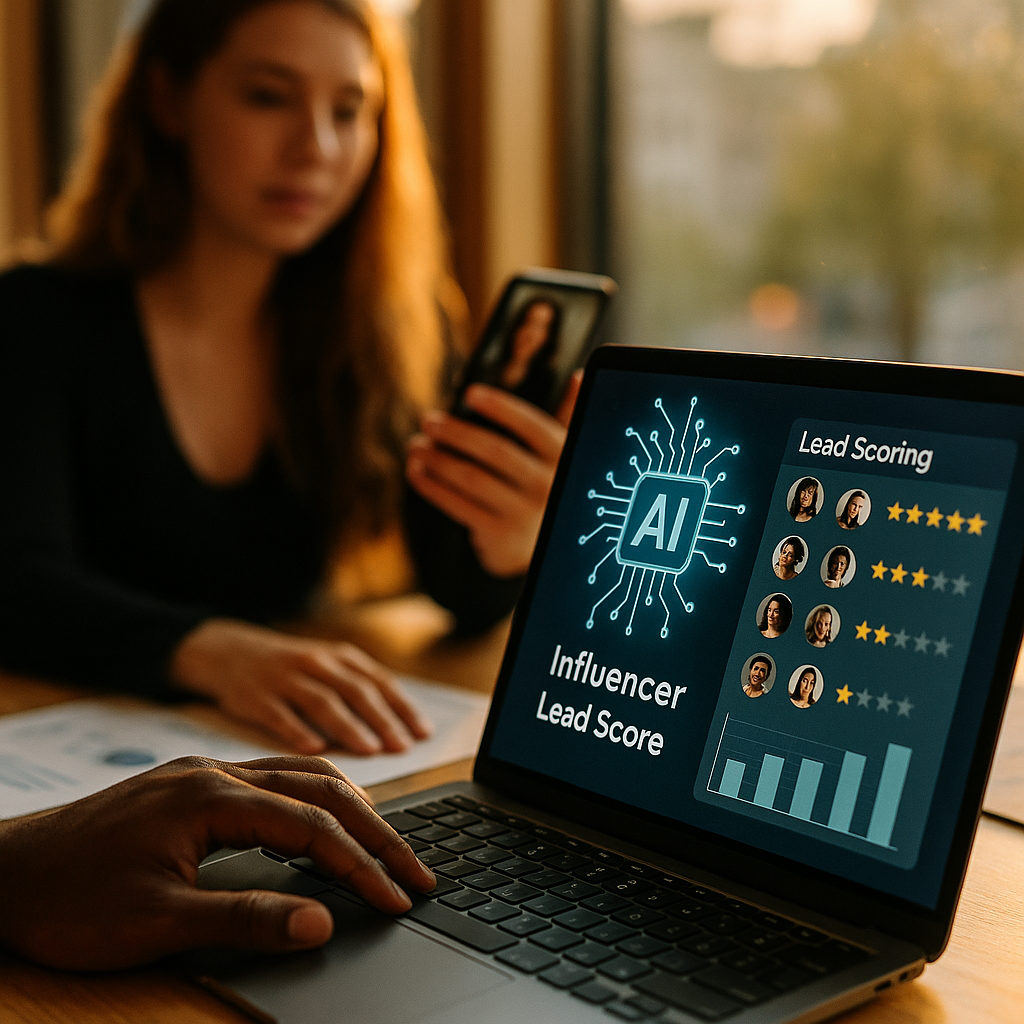Using AI for predictive lead scoring from influencer-generated traffic is revolutionizing digital marketing in 2025. Brands harness data-driven insights to identify high-value leads faster and more accurately than ever. This article explores how integrating AI with influencer marketing delivers measurable results—and why early adopters of this trend enjoy a competitive advantage.
Harnessing Influencer-Generated Traffic for Lead Generation
Influencer marketing has evolved into a powerhouse for generating authentic engagement and driving targeted traffic. According to Statista, over 70% of brands increased their influencer marketing budgets in 2025, seeking quality leads with measurable ROI. Unlike broad advertising, influencer campaigns attract niche audiences whose trust in creators can amplify your lead pool’s quality.
However, not all influencer-generated traffic holds equal value. Many leads may browse but never convert. This variability highlights the necessity of predictive lead scoring tools, especially those powered by AI. By discerning which visitors are most likely to convert, marketers allocate resources more effectively and personalize follow-up to maximize value.
Unpacking Predictive Lead Scoring with AI Algorithms
Predictive lead scoring is the process of ranking leads by their likelihood to convert, leveraging patterns in historical data. Traditional scoring often relies on static criteria like demographics or engagement metrics. In 2025, AI-driven solutions transform this process with machine learning and real-time behavioral tracking.
AI algorithms ingest multiple data points from influencer traffic, analyzing user intent, source credibility, session duration, social signals, and more. Over time, the system continuously refines scores as new data flows in, adapting to changing influencer tactics, audience preferences, and buyer journeys. This dynamic approach results in more accurate and actionable lead prioritization.
Key Benefits of AI-Powered Lead Scoring for Influencer Campaigns
Integrating AI for predictive lead scoring from influencer-generated traffic delivers several distinct advantages:
- Accuracy: AI models process vast datasets to detect subtle conversion signals missed by manual methods.
- Speed: Real-time analysis accelerates follow-up, improving your chance of conversion while leads are still warm.
- Scalability: AI handles the surge in traffic from influencer campaigns without additional labor or risk of bias.
- Personalization: With precise scoring, nurture sequences and offers can be tailored based on lead potential, raising engagement and CLV.
- Continuous learning: Each new campaign trains your system to predict future lead quality better, fueling long-term ROI.
According to recent HubSpot insights, brands using AI for predictive lead scoring reported a 27% improvement in conversion rates over those sticking with static models.
Implementing AI-Driven Lead Scoring: A Step-by-Step Process
Adopting AI-powered lead scoring for influencer-generated traffic calls for a strategic approach. Here’s a practical blueprint for success:
- Aggregate Data: Integrate your influencer campaign platforms (Instagram, TikTok, YouTube, etc.) and CRM tools to centralize all relevant visitor data.
- Train AI Models: Feed historical and real-time traffic data into machine learning models to establish a baseline and refine predictions.
- Define Conversion Criteria: Establish a clear definition of what constitutes a marketing-qualified lead (MQL) for your business.
- Automate Workflows: Use automation to route high-scoring leads directly to sales teams or trigger personalized nurture sequences.
- Monitor and Optimize: Use analytics to compare predicted vs. actual conversions and fine-tune lead scoring algorithms continuously.
Organizing stakeholders early, investing in high-quality data, and prioritizing transparency ensures ethical AI use and maximum performance. Marketers who follow these steps can close the loop between influencer engagement and sales outcomes.
Addressing Data Privacy and EEAT in AI Lead Scoring
With the surge in data collection through influencer collaborations, maintaining data privacy and upholding Google’s EEAT (Experience, Expertise, Authoritativeness, Trustworthiness) standards is crucial in 2025. Transparent data consent practices and robust security protocols build trust with customers and content creators alike.
Work with AI providers experienced in ethical data handling, regularly audit systems for compliance, and provide clear disclosures on data usage. By demonstrating expertise and authoritativeness in both influencer marketing and AI implementation, brands not only improve lead quality but also reputation and long-term customer loyalty.
Measuring Success: KPIs for AI-Powered Predictive Lead Scoring
Evaluating the effectiveness of AI-driven lead scoring for influencer-generated traffic requires tracking key performance indicators (KPIs):
- Lead Conversion Rate: The percentage of scored leads that ultimately become paying customers.
- Lead Velocity: The speed at which high-scoring leads move through the sales funnel.
- Lead Value: Revenue generated per qualified lead, compared to baseline campaigns.
- Influencer Attribution: The accuracy with which AI attributes conversions to specific influencers or campaigns.
- Waste Reduction: Decrease in time or budget spent on low-quality or unqualified leads.
Use these KPIs to assess ROI, demonstrate the value of influencer partnerships, and refine future campaign and scoring strategies for optimal impact.
FAQs: AI for Predictive Lead Scoring from Influencer Traffic
-
How does AI identify high-quality leads in influencer-generated traffic?
AI analyzes behavioral cues from traffic—including engagement, referral source, session patterns, and onsite actions—compared to past conversion data. The system learns which interactions most frequently predict conversion and scores new leads accordingly.
-
Can predictive lead scoring work with micro-influencers’ audiences?
Yes. AI models are highly effective regardless of audience size, as they focus on user behavior and conversion history rather than raw volume. In fact, micro-influencer audiences are often more engaged, making predictive scoring even more valuable.
-
What are the data privacy implications of using AI in lead scoring for influencer campaigns?
Brands must ensure all data collection complies with privacy regulations and users provide explicit consent. Choose vendors with strong security standards and keep users informed about how their data is used.
-
How quickly can brands see results from implementing AI-driven lead scoring?
Most brands observe improved conversion rates within four to six weeks, as AI models adapt to campaign data and optimize scoring. Results are often more pronounced in ongoing influencer collaborations.
In summary, using AI for predictive lead scoring from influencer-generated traffic drives superior lead quality, faster conversions, and stronger ROI. As influencer marketing grows, integrating smart AI tools positions brands at the forefront of innovation—offering a clear, data-driven edge for customer acquisition in 2025.
